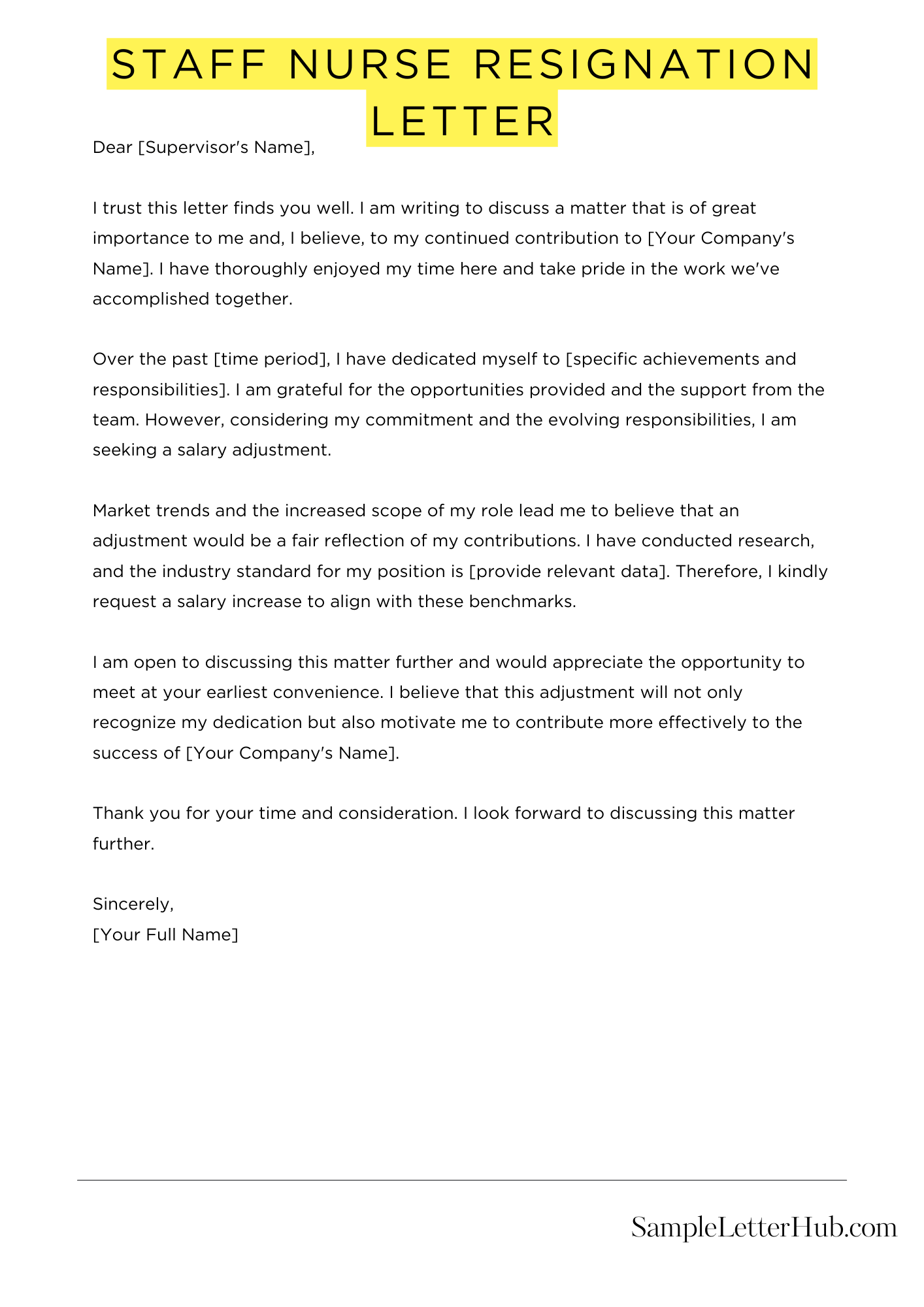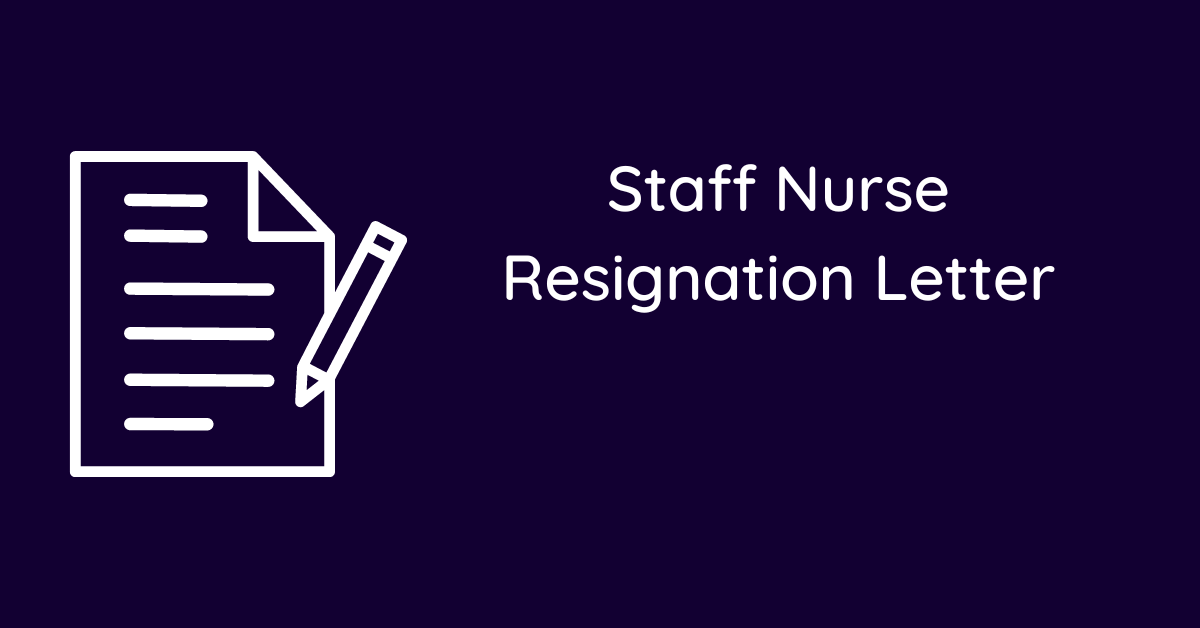Writing a staff nurse resignation letter can be a daunting task, but it’s an important step in leaving your job on a positive note. In this article, we’ll share an example of a staff nurse resignation letter that you can use as inspiration.
When writing your resignation letter, it’s important to be polite and humble. Remember, you’re leaving on good terms, and you want to maintain a positive relationship with your employer. Be clear and concise in your letter, and explain your reasons for leaving in a professional manner.
Below, we’ve included a template for a staff nurse resignation letter that you can use. Feel free to adapt it to your own needs.
Staff Nurse Resignation Letter
Dear [Recipient Name],
Please accept this letter as formal notification that I will be resigning from my position as a Staff Nurse at [Hospital/Organization Name], effective [last date of employment].
I have appreciated the opportunity to work at [Hospital/Organization Name] and am grateful for the experience and support I have received during my time here. I wish the hospital and my colleagues all the best in the future.
Thank you for your understanding and support.
Sincerely,
[Your Signature]
Short Staff Nurse Resignation Letter Sample
Please accept this letter as formal notification that I am resigning from my position as Staff Nurse at [Company Name]. My last day of employment will be [Your Last Day]. Thank you for the opportunity to grow and learn during my time here. I wish you and the company continued success. I am happy to assist in the transition process to ensure a smooth handover of my responsibilities.
I wish you all the best with your staff nurse resignation letter.
When it’s time to say farewell, expressing your gratitude and best wishes can make the transition smoother:

How to Write a Staff Nurse Resignation Letter
1. Start with a Formal Introduction
Begin your letter with a formal salutation, such as “Dear [Manager’s Name]”. State your intention to resign from your position as a Staff Nurse, clearly indicating your last date of employment.
2. Express Gratitude and Appreciation
Take this opportunity to express your gratitude for the opportunities and experiences you have gained during your time at the organization. Mention specific individuals or projects that have made a meaningful impact on your professional growth.
3. State Your Reasons for Leaving (Optional)
While it’s not always necessary to provide specific reasons for your departure, you may choose to briefly mention your motivations for moving on. Be professional and avoid negative or critical language.
4. Offer Assistance with the Transition
Demonstrate your commitment to a smooth transition by offering to assist in any way possible. This could include training your replacement or providing documentation on your responsibilities.
5. End with a Professional Closing
Conclude your letter with a formal closing, such as “Sincerely” or “Respectfully”. Include your full name and signature below.
6 Most Frequently Asked Questions About Staff Nurse Resignation Letters
Staff nurse resignation letters are an essential part of the process of leaving a nursing position. They serve as a formal notification to your employer of your intent to resign and should be written with care and professionalism. Here are the six most frequently asked questions about staff nurse resignation letters, along with their answers:
1. What is the proper format for a staff nurse resignation letter?
A staff nurse resignation letter should be written in a professional and formal tone. It should include your name, address, phone number, email address, the date, and the name and address of your employer. The body of the letter should include a statement of your intent to resign, your last date of employment, and a brief expression of gratitude for the opportunity to work at the organization.
2. What should I include in the body of my resignation letter?
In the body of your resignation letter, you should clearly state your intent to resign from your position as a staff nurse. You should also include your last date of employment. Additionally, you may want to include a brief statement of gratitude for the opportunity to work at the organization.
3. How much notice should I give my employer?
The amount of notice you should give your employer will vary depending on your contract and the policies of your organization. However, it is generally considered good practice to give at least two weeks’ notice. This will give your employer time to find a replacement and ensure a smooth transition.
4. What should I do if I am asked to stay?
If you are asked to stay by your employer, it is important to consider your options carefully. You may want to negotiate a different end date or discuss other options with your employer. Ultimately, the decision of whether or not to stay is up to you.
5. What if I am leaving on bad terms?
If you are leaving your position on bad terms, it is important to remain professional in your resignation letter. Avoid making any negative comments about your employer or your experience at the organization. Instead, focus on the positive aspects of your experience and express your gratitude for the opportunity to work there.
6. What are some tips for writing a strong resignation letter?
Here are some tips for writing a strong resignation letter:
* Keep it brief and to the point.
* Be clear and concise.
* Be professional and respectful.
* Proofread your letter carefully before submitting it.
Before making the decision to resign from your job, it’s essential to consider the legal aspects:
Understanding your emotions after quitting your job is important. Explore why you might be feeling sad:
Related
- Resignation letter sample
- Forced resignation letter
- Resignation letter due to going abroad
- Resignation letter due to marriage
- Resignation letter due to other opportunity
- Resignation letter due to mistake

